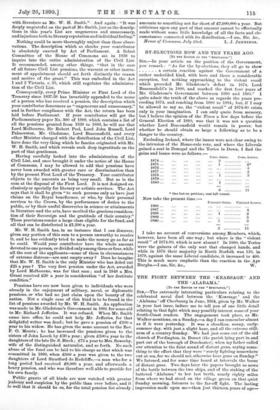BY-ELECTIONS NOW AND TEN YEARS AGO. ['In THE EDITOR OF
THE " SPECTATOR.")
Sza,—In your article on the position of the Government, you remark : " As for the by-elections, they all go to show
a certain reaction against the Government of a rather undecided kind, with here and there a considerable exception, but nothing approaching to the violent recoil which preceded Mr. Gladstone's defeat in 1874, Lord Beaconsfield's in 1880, and marked the first four years of Mr. Gladstone's Government between 1880 and 1885." I quite admit the truth of the above as regards the years pre- ceeding 1874, and reaching from 1880 to 1884; but, if I may be allowed to say so, the " violent recoil" of 1874-80 exists only in your imagination. I can only quote from memory, but I believe the opinion of the Times a few days before the General Election of 1880, was that it was not a question whether Lord Beaconsfield would remain in power, but whether he should obtain so large a following as to be a danger to the country.
Excluding Ireland, where the issues were not clear owing to the intrusion of the Home-rule vote, and where the Liberals gained a seat in Donegal and the Tories in Down, I find the gains and losses were as follows :- Cons. Gains. Cons. Loaves.
1874 ... ••• 3 1875 ... ••• 1 2*
1876 . 4
1877 . 2 1878 ... •• • 1 3 1879 ... • • 1880 ... ... 1 6 11 • One lost on petition; seat left vacant.
Now take the present time :— Unionist Gains. Unionist Losses.
1886 ... . .
1887 ... 4
1888 ... ••• 1 8 1889 ... • 5 1890 ... •• • 1 3 2 15 I take no account of conversions among Members, which, however, have been all one way ; but where is the " violent recoil" of 1874-80, which is now absent? In 1880, the Tories were the gainers of the only seat that changed hands, and while in 1876 their majority in North Norfolk was 110, in 1879, against the same Liberal candidate, it increased to 490. This is much more emphatic than the reaction in the Ayr


































 Previous page
Previous page